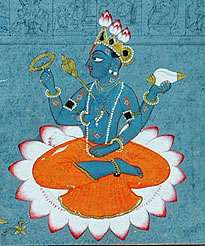Om Namo Bhagavate Vasudevaya
| Part of a series on |
| Vaishnavism |
|---|
 |
|
Sampradayas |
|
Philosophers–acharyas |
|
Related traditions |
|
|
Om Namo Bhagavate Vasudevaya (![]() listen ) (in devanagari: ॐ नमो भगवते वासुदेवाय) is a Hindu mantra. ‘Om Namo Bhagavate Vasudevaya’ is a mantra of Vishnu and Krishna both. It has two traditions—Tantric and Puranic. In Tantrik Tradition, the Rishi of the Mantra is Prajapati, in Puranic Tradition the Rishi is Narada. Both, however, say it is the Supreme Vishnu Mantra. Sharada Tilak Tantram, for example, says "Dvadasharno mahamantrah pradhano Vaishnavagame"—the twelve lettered mantra is the chief among vaishnava mantras. Similarly, this is the ultimate mantra in ShrimadBhagavatam, whose 12 Chapters are taken as extensions of the 12 Letters of this Mantra.[1] This twelve syllable mantra[2] is known as a Mukti (liberation) mantra and a spiritual formula for attaining freedom.[3] This can be chanted like Gayatri Mantra.[4] This is the principal mantra of the Vedic scripture "Srimad Bhagavatam".[5] This mantra can also be found in Vishnu Purana.
listen ) (in devanagari: ॐ नमो भगवते वासुदेवाय) is a Hindu mantra. ‘Om Namo Bhagavate Vasudevaya’ is a mantra of Vishnu and Krishna both. It has two traditions—Tantric and Puranic. In Tantrik Tradition, the Rishi of the Mantra is Prajapati, in Puranic Tradition the Rishi is Narada. Both, however, say it is the Supreme Vishnu Mantra. Sharada Tilak Tantram, for example, says "Dvadasharno mahamantrah pradhano Vaishnavagame"—the twelve lettered mantra is the chief among vaishnava mantras. Similarly, this is the ultimate mantra in ShrimadBhagavatam, whose 12 Chapters are taken as extensions of the 12 Letters of this Mantra.[1] This twelve syllable mantra[2] is known as a Mukti (liberation) mantra and a spiritual formula for attaining freedom.[3] This can be chanted like Gayatri Mantra.[4] This is the principal mantra of the Vedic scripture "Srimad Bhagavatam".[5] This mantra can also be found in Vishnu Purana.
Meaning
Om Namo Bhagavate Vasudevaya means "Om, I bow to Lord Vasudeva or Lord Krishna".[5]
| Term | Devanagari | Listen | Meaning |
|---|---|---|---|
| Om | | Refers to the Supreme Infinite Spirit or Person. Om represents the Shabda Brahman. | |
| Namo | Salutation, worship , a common spoken valediction or salutation originating from the Indian subcontinent. 'Namo' नमो is the Sandhi form of 'namas' नमस्, neuter nominative singular. | ||
| Bhagavate | 1. God in Sanskrit, someone who is considered God (or equally powerful, merciful). 'Bhagavate' भगवते is the dative of 'bhagavat' भगवत्. 2. Bhagavate is one who is becoming divine.[6] | ||
| Vasudevaya | Name of Krishna, Krishna is also known as Vaasudeva (Krishna), because he was the son of Vasudeva. In the Bhagavad-Gita, Arjuna called Krishna by the name Vaasudeva multiple times. 'Vāsudevāya' वासुदेवाय is the dative of 'vāsudeva' वासुदेव. Other meaning for Vasudevaya is Vasu means "Life in all beings" Devaya means "God". This means God(life/light) who lives of all beings. |
Importance
Om Namo Bhagavate Vasudevaya means "prostration to Krishna" or "surrender to Krishna."[7] Krishna himself asked his devotees to completely surrender to him:
| “ | सर्वधर्मान्परित्यज्य मामेकं शरणं व्रज ।
अहं त्वां सर्वपापेभ्यो मोक्षयिष्यामि मा शुचः ॥१८- ६६॥
|
” |
Krishna also proclaimed "Everybody should recite "Om Namo Bhagavate Vasudevaya" mantra daily whenever possible so that I will stand by them. I respond to the call of the heart immediately and invariably. See me in your duties. I am committed to those who are committed to their duties. Believe in putting faith in me and make me your own".[8]
Popular culture
- Dhruva used this as his mantra in his penance. Dhruva was initiated by Narada into chanting.[9]
- Swami Vivekananda used this phrase multiple times in his lectures and letters.[10][11]
- Swami Sivananda suggested to repeat mantras like Om or "Om Namo Bhagavate Vasudevaya".[12]
- In places like Rishikesh, some people use "Om Namo Bhagavate Vasudevaya" to greet each other.
- Vedanta philosopher Dayananda Saraswati wrote a book named "Om Namo Bhagavate Vasudevaya".[13]
See also
References
- ↑ "Om Namoh Bhagavate Vasudevaya meaning". Retrieved 14 April 2012.
- ↑ Alexander Studholme (2002). The Origins of Oṃ Maṇipadme Hūṃ: A Study of the Kāraṇḍavyūha Sūtra. SUNY Press. p. 177. ISBN 978-0-7914-5389-6. Retrieved 24 June 2012.
- ↑ "Om Namo Bhagavate Vasudevaya". Retrieved 14 April 2012.
- ↑ K. K. Nair (26 March 2007). Sages Through Ages: India's Heritage. AuthorHouse. pp. 83–. ISBN 978-1-4184-4689-5. Retrieved 24 June 2012.
- 1 2 J. Donald Walters (1 March 2002). The Art and Science of Raja Yoga: Fourteen Steps to Higher Awareness : Based on the Teachings of Paramhansa Yogananda. Crystal Clarity Publishers. pp. 251–. ISBN 978-1-56589-166-1. Retrieved 24 June 2012.
- ↑ "Chanting Om Namo Bhagavate Vasudevaya". Retrieved 14 April 2012.
- ↑ Swami Krishnananda. "The Significance of Mantra-Japa Sadhana". http://www.swami-krishnananda.org. Retrieved 14 April 2012. External link in
|publisher=(help) - ↑ "Autobiography Of Parampoojya Leelavati Karve". yogeshwar.org/. Retrieved 4 May 2012.
- ↑ "Dhruva". Vaniquotes. Retrieved 14 April 2012.
- ↑ "Swami Vivekananda Letters". Vedanta network Boston. Retrieved 14 April 2012.
- ↑ "Swami Vivekananda letter the 15th February [1893]". Ramakrishna Vivekananda Info. Retrieved 14 April 2012.
- ↑ "20 Instructions by Swami Sivanananda". Writespirit. Retrieved 14 April 2012.
- ↑ "Om Namo Bhagavate Vasudevaya by Swami Dayananda Saraswati". http://www.vedicbooks.net/. Retrieved 4 May 2012. External link in
|publisher=(help)